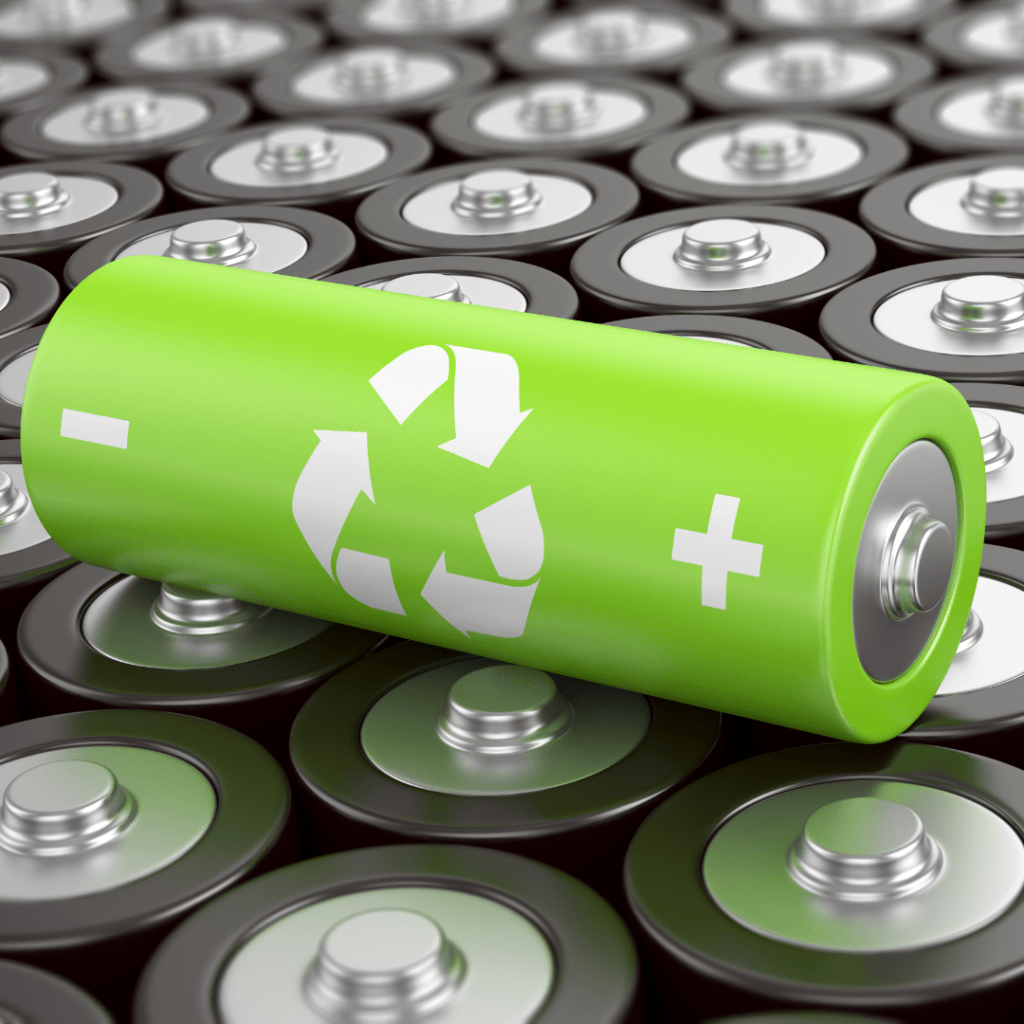Impact of Portable Battery Waste on the Environment
There are more batteries in the world than there are people, with an estimated 4 billion AA alkaline cells[1] produced every year. Once a marvel of science, single-use batteries have become a common junk drawer item that most of us take for granted. There’s probably one hiding in your TV remote, computer mouse, and bathroom scale right now. Batteries are so ordinary, in fact, that we often forget just how much havoc these tiny powerhouses can wreak on the environment.
But First: What are Batteries Made Of?
There are many different types of batteries, each made from distinct materials. However, they all work on the same principle and contain similar components:
- Two different metals (called the anode and the cathode)
- A chemical solution between the metals (called an electrolyte)
- A separator between the two metals. In modern dry-cell batteries, the separator is a layer of absorbent material that holds the electrolyte.
Metals commonly found in disposable batteries include zinc, copper, lithium, nickel, and manganese. The electrolyte in a battery is typically made from potassium hydroxide, ammonium chloride, or lithium salts. Understanding what batteries are made from can help us better understand their environmental impact.
Why is Battery Waste Bad for the Environment?
All batteries (even rechargeable ones) eventually die and must be thrown away. However, you can’t just throw them in the bin with the rest of the rubbish. If you do, they are likely to end up in a landfill. Batteries lying in landfills slowly corrode and release their toxic contents into the environment, which has many negative consequences.
Soil Contamination
In urban and suburban areas, soil quality is not always top of mind for the average resident. While we might not be growing food in the ground, it’s still important to keep our soil clean. Numerous studies[2] show that dumping e-waste and spent batteries leads to increased levels of heavy metals in the soil. Many of these metals, including lead, nickel, and cadmium, are toxic to humans and animals.
They also upset the natural composition of the soil, disturbing microorganisms that live underground. This can have knock-on effects on surrounding ecosystems. Finally, the electrolytes found in battery waste may alter the soil’s pH and interfere with plant life.
Water Contamination
Did you know there is more liquid freshwater underground than on Earth’s surface? Most of our groundwater is stored in aquifers, which are water-saturated layers of sand or rock. Sadly, pollutants from the soil often seep into these spaces and contaminate groundwater reserves. That means heavy metals and chemicals from dumped batteries may eventually end up in our drinking water.
Battery waste can also pollute rivers, lakes, and oceans. Consistent rainfall corrodes the batteries and carries their chemical contents into stormwater systems, which feed into natural waterways. The influx of minerals and metals may upset delicate marine ecosystems.
Threatens Food Supply
When pollutants from battery waste contaminate the soil and water, it stands to reason that they will eventually contaminate the plants too. Roots pull nutrients and minerals from the ground into a plant’s stem and leaves to help it grow. Numerous studies have found higher concentrations of heavy metals in food crops planted near e-waste dump sites.
Reduced crop quality isn’t the only concern. Heavily polluted soil can also prevent the plants from absorbing other nutrients, stunting their growth and causing lower yields for farmers. Regular bad harvests may threaten food security and the agricultural economy.
Harmful to Wildlife
Like humans, birds and animals need healthy food and clean drinking water. Polluted soils, groundwater, and plants pose the same health risks to wildlife as they do to people. Wild animals and birds may even ingest chemicals directly when foraging for food in landfills and dumpsites. Some pollutants can cause reproductive issues that may reduce wildlife populations and disrupt the food chain.
Dumping batteries in nature can also destroy habitats, making them unliveable for wildlife and chasing away many beneficial birds and animals. Forcing animals into smaller spaces can threaten their natural breeding patterns and contribute towards extinction.
The Good News is Batteries are Recyclable
Despite the problems batteries can cause, they are also an important part of our world. They help us get our work done, communicate with faraway friends, and simply see in the dark. Like all good things in life, it’s important to enjoy them responsibly. Rather than throwing dead batteries away without a second thought, think about the environment and recycle them instead.
Battery recycling bins are available at selected Makro, Leroy Merlin, Woolworths, and Pick ‘n Pay stores nationwide. Alternatively, you can contact eWASA to find an accredited e-waste recycling company near you.
Since 2023, businesses that sell portable batteries have been subject to extended producer responsibility (EPR). The regulation states that these companies must implement measures to help their customers recycle the batteries they buy. For more information about EPR and how to implement it in your business, please contact us.
[1] https://www.sciencedirect.com/science/article/pii/S2351978920307794
[2] https://www.ncbi.nlm.nih.gov/pmc/articles/PMC6466021/


